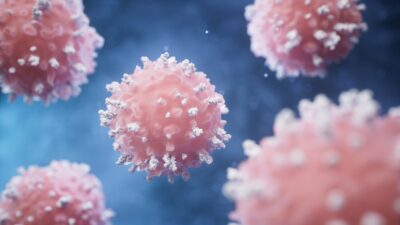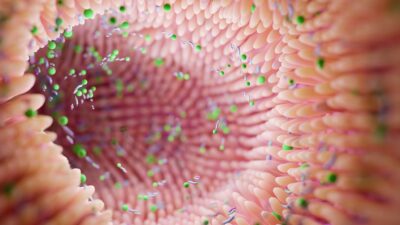Rejuvenation Roundup July 2024
- What you are isn't just what you eat, it's also how you digest it.

Entirely new approaches with surprisingly good results have been recently discovered and published in July’s papers. Here’s what the research world has revealed this month.
LEAF News
Interviews
 Longevity Biotech Fellowship: Road To A Post-Aging Society: The Longevity Biotech Fellowship is one of the most interesting longevity-related initiatives in the last couple of years. Co-founded by Mark Hamalainen and Nathan Cheng, both well-known figures in the longevity field, LBF has been everywhere: presenting at conferences, participating in co-living projects such as Zuzalu and Vitalia, and generally connecting longevity people.
Longevity Biotech Fellowship: Road To A Post-Aging Society: The Longevity Biotech Fellowship is one of the most interesting longevity-related initiatives in the last couple of years. Co-founded by Mark Hamalainen and Nathan Cheng, both well-known figures in the longevity field, LBF has been everywhere: presenting at conferences, participating in co-living projects such as Zuzalu and Vitalia, and generally connecting longevity people.
Advocacy and Analysis
Four Days of Longevity in Dublin: Conference Highlights: The annual Longevity Summit Dublin happened this June, and we are bringing you the highlights. Initiated by Aubrey de Grey and Martin O’Dea in 2022, this conference has earned a reputation for combining scientific depth with just the right amount of quirkiness over full four days of talks, panels, and late-night networking.
Research Roundup
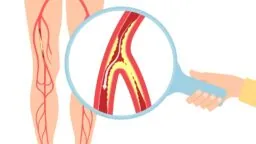 Nicotinamide Riboside Improves Walking in Clinical Trial: Researchers publishing in Nature Communications have found that nicotinamide riboside (NR) improves walking distance for people who have peripheral artery disease in the legs. Ischemia, the failure of blood vessels to deliver sufficient oxygen and nutrients, is a key part of both fatal and disabling conditions.
Nicotinamide Riboside Improves Walking in Clinical Trial: Researchers publishing in Nature Communications have found that nicotinamide riboside (NR) improves walking distance for people who have peripheral artery disease in the legs. Ischemia, the failure of blood vessels to deliver sufficient oxygen and nutrients, is a key part of both fatal and disabling conditions.
Recurrent Pregnancy Loss Associated with Increased Dementia: A recent paper in the European Journal of Epidemiology reported that recurrent miscarriage and stillbirths are associated with the occurrence of dementia, but there was insufficient evidence to establish such a connection between infertility and dementia. Dementia affects women more frequently than men.
 A New Target for Chronic Lung Diseases: Revealing their findings in Aging Cell, researchers have found a new biochemical target for chronic obstructive pulmonary disease (COPD). Smoking is only one cause COPD, which is characterized by bouts of lung problems, has only limited treatments, is progressive and currently incurable, and often occurs in people over 60.
A New Target for Chronic Lung Diseases: Revealing their findings in Aging Cell, researchers have found a new biochemical target for chronic obstructive pulmonary disease (COPD). Smoking is only one cause COPD, which is characterized by bouts of lung problems, has only limited treatments, is progressive and currently incurable, and often occurs in people over 60.
Novel Drug Suppresses Metastatic Cancer in Mice: Scientists have found a small molecule that turns an anti-apoptotic protein into a pro-apoptotic one, protecting against deadly metastases in a mouse model of human triple-negative breast cancer and, potentially, in other cancers.
 A Molecular Reason Why Exercise Fights Senescence: Researchers publishing in Aging have found a molecule linking exercise to the inhibition of cellular senescence, one of the hallmarks of aging. PEDF’s molecular effects were found to be related to the interaction of the microRNA miR-127, which promotes senescence, and BCL-6, a protein that is negatively associated with senescence.
A Molecular Reason Why Exercise Fights Senescence: Researchers publishing in Aging have found a molecule linking exercise to the inhibition of cellular senescence, one of the hallmarks of aging. PEDF’s molecular effects were found to be related to the interaction of the microRNA miR-127, which promotes senescence, and BCL-6, a protein that is negatively associated with senescence.
Scientists Eliminate Cancer Using Evolutionary Principles: A new study describes a method of genetically modifying a fraction of tumor cells, programming them to self-destruct and take therapy-resistant cells with them. Advanced solid tumors remain the main challenge for modern oncology.
 Precision Nutrition Improves Life Quality for Older People: Researchers compared general nutritional advice to individualized nutritional advice in addition to an app that encourages its users to follow a diet. Elderly overweight and obese people benefited more from the individualized approach.
Precision Nutrition Improves Life Quality for Older People: Researchers compared general nutritional advice to individualized nutritional advice in addition to an app that encourages its users to follow a diet. Elderly overweight and obese people benefited more from the individualized approach.
Sex Differences in the Blood-Brain Barrier and Alzheimer’s: Researchers have found that men and women have significant differences in how their brains’ blood vessels change in Alzheimer’s disease. In older women, a decrease in estrogen causes vascular decline, making them more susceptible to Alzheimer’s.
 Modified Natural Killer Cells Effective Against Liver Cancer: By making NK cells insensitive to tumor-secreted TGF-β, scientists have improved their efficacy against this deadly hepatocellular carcinoma (HCC). Cancer cells, which are supposed to be vulnerable to the immune system, develop various defensive mechanisms to avoid detection and decrease immune cells’ fitness and viability, which this approach combats.
Modified Natural Killer Cells Effective Against Liver Cancer: By making NK cells insensitive to tumor-secreted TGF-β, scientists have improved their efficacy against this deadly hepatocellular carcinoma (HCC). Cancer cells, which are supposed to be vulnerable to the immune system, develop various defensive mechanisms to avoid detection and decrease immune cells’ fitness and viability, which this approach combats.
Mixed Results in Probiotic Trial Against Inflammaging: Researchers publishing in Probiotics and Antimicrobial Proteins have published the results of a clinical trial on the effects of a probiotic on inflammaging in older people.
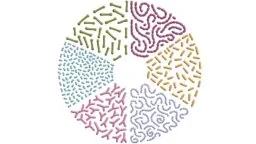 Probiotics Have Positive Cognitive Effects in Trial: A clinical trial has found that consuming a multi-species probiotic formulation positively impacts mental well-being and improves cognitive functions. The gut microbiome is a gathering of microorganisms in the human gut that plays multiple essential functions, from nutrient absorption to immune system modulation.
Probiotics Have Positive Cognitive Effects in Trial: A clinical trial has found that consuming a multi-species probiotic formulation positively impacts mental well-being and improves cognitive functions. The gut microbiome is a gathering of microorganisms in the human gut that plays multiple essential functions, from nutrient absorption to immune system modulation.
Discovering Why an Inflammatory Compound Inhibits Cancer: In Aging Cell, researchers have published their findings into why the inflammatory factor IL-6 inhibits cancerous tumors when generated inside the cell. IL-6 affects both senescence and cancer proliferation.
 Late-Life Treatment Increases Mouse Lifespan by 25%: A new mouse study has found that both germline knockout and late-life inhibition of the pro-inflammatory cytokine IL-11 lead to comparable and powerful healthspan and lifespan extension.
Late-Life Treatment Increases Mouse Lifespan by 25%: A new mouse study has found that both germline knockout and late-life inhibition of the pro-inflammatory cytokine IL-11 lead to comparable and powerful healthspan and lifespan extension.
Exploring How Stiffness Promotes Osteoarthritis: In iScience, researchers have explained how physical mechanics can alter mitochondrial function in a way that leads to osteoarthritis. Abnormal mechanical loading, which occurs when joints are placed under excessive stresses in ways that they were not meant to handle, is a key driver of osteoarthritis.
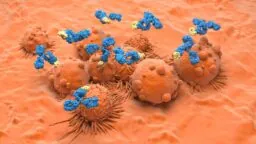 Antinuclear Antibody Shows Promise Against Cancer: Scientists have developed a conjugate of a drug and a nucleus-targeting antibody that can attack multiple types of cancer cells without targeting a particular antigen. The researchers developed an antinuclear antibody-drug conjugate (ANADC) that targets tumor-specific “nucleoside junkyards” and hitches a ride into tumor cells with those same transporter proteins.
Antinuclear Antibody Shows Promise Against Cancer: Scientists have developed a conjugate of a drug and a nucleus-targeting antibody that can attack multiple types of cancer cells without targeting a particular antigen. The researchers developed an antinuclear antibody-drug conjugate (ANADC) that targets tumor-specific “nucleoside junkyards” and hitches a ride into tumor cells with those same transporter proteins.
A Switch to Whole Food Diets Benefits Elderly People: New research demonstrated how transitioning from a typical Western diet composed of processed foods to a whole-food diet improved cardiometabolic health and body composition and impacted gut microbiome metabolites in elderly people.
 Exploring Senescence in Tendon Function: In Aging Cell, researchers have published new data on the relationship between senescence and the extracellular matrix in the tendons of older people. Injuries to the musculoskeletal system are responsible for over a quarter of the years that elderly people spend in disability, and they are progressively more difficult to heal with age.
Exploring Senescence in Tendon Function: In Aging Cell, researchers have published new data on the relationship between senescence and the extracellular matrix in the tendons of older people. Injuries to the musculoskeletal system are responsible for over a quarter of the years that elderly people spend in disability, and they are progressively more difficult to heal with age.
Cellular Reprogramming Improves Cognition in Aged Rats: Scientists have shown that prolonged, continuous expression of reprogramming factors counters cognitive decline in old rats and probably decreases their epigenetic age. Cellular reprogramming, the act of bringing differentiated cells back to a stem-like pluripotent state by expressing certain genes, has been one of the hottest subfields in longevity.
 Surprising Effects of Regular Fasting in Model Organisms: Research published in Aging Cell has revealed that a nematode species commonly used for aging research lives much longer on an alternate-day fasting regimen, but only when it is administered in middle age and only when the worms are consuming an animal-based protein source.
Surprising Effects of Regular Fasting in Model Organisms: Research published in Aging Cell has revealed that a nematode species commonly used for aging research lives much longer on an alternate-day fasting regimen, but only when it is administered in middle age and only when the worms are consuming an animal-based protein source.
Senescence May Play a Significant Role in Parkinson’s: In Aging, a pair of researchers has published a perspective connecting fat (lipid) accumulation and cellular senescence in neurons to Parkinson’s disease. Parkinson’s disease is characterized by the loss of a specific population of neurons: the dopaminergic neurons in the substantia nigra, a part of the brain that governs movement.
 A Key Pathway for Sarcopenia Reversal: In Aging Cell, researchers have published a paper on a cellular energy source that appears to be a key signaling molecule in sarcopenia. Sarcopenia, a condition that increases with aging, reduces muscle mass in older people, and leads to a decreased quality of life, has been documented to have multiple root causes, and this appears to be a major one.
A Key Pathway for Sarcopenia Reversal: In Aging Cell, researchers have published a paper on a cellular energy source that appears to be a key signaling molecule in sarcopenia. Sarcopenia, a condition that increases with aging, reduces muscle mass in older people, and leads to a decreased quality of life, has been documented to have multiple root causes, and this appears to be a major one.
Very Old People Have Healthy Gut Bacteria: The authors of a recent review investigated what is known about gut microbiota in centenarians and how gut microbes can help people achieve extreme longevity. Microbes whose levels are decreased in centenarians were found to possess “antioxidant and anti-inflammatory effects.”
Extended lifespan in female Drosophila melanogaster through late-life calorie restriction: Late-life calorie restriction increases lifespan in female flies aged on a high-calorie diet.
Unveiling the epigenetic impact of vegan vs. omnivorous diets on aging: insights from the Twins Nutrition Study (TwiNS): This study suggests that a short-term vegan diet is associated with epigenetic age benefits and reduced calorie intake.
Long-Term Improvement in Hippocampal-Dependent Learning Ability in Healthy, Aged Individuals Following High Intensity Interval Training: Sustained improvement in hippocampal function to this extent confirms that such exercise-based interventions can provide significant protection against hippocampal cognitive decline in the aged population.
Oral Antioxidant and Lutein/Zeaxanthin Supplements Slow Geographic Atrophy Progression to the Fovea in Age-Related Macular Degeneration: Proximity-based progression towards the central macula was significantly slower with randomization to antioxidants versus none.
Discontinuation versus continuation of statins: A systematic review: Statin discontinuation does not appear to affect short-term mortality near end-of-life based on one trial. Outside of this population, findings from non-randomized studies consistently suggested statin discontinuation may be associated with worse outcomes, though this is uncertain.
Nicotinamide N-methyltransferase inhibition mimics and boosts exercise-mediated improvements in muscle function in aged mice: These studies suggest that NNMTi-based drugs, either alone or combined with exercise, will be beneficial in treating sarcopenia and a wide range of age-related myopathies.
Recombinant FOXN1 fusion protein increases T cell generation in old mice: These results suggest that the rFOXN1 fusion protein has the potential to be used in preventing and treating T cell immunodeficiency in older adults.
Discovery and characterization of a new class of NAD+-independent SIRT1 activators: These compounds could serve as candidate leads for a novel therapeutic strategy aimed at addressing a key metabolic deficiency that may contribute to metabolic and age-associated diseases.
Overexpression of mitochondrial fission or mitochondrial fusion genes enhances resilience and extends longevity: This work demonstrates that increasing the expression of these genes extends lifespan and improves biological resilience without promoting the maintenance of a youthful mitochondrial network morphology.
An expedited screening platform for the discovery of anti-ageing compounds in vitro and in vivo: This method expands the scope of CpG methylation profiling to accurately and rapidly detecting the anti-aging potential of drugs by using human cells.
Inhibitory immune checkpoints suppress the surveillance of senescent cells promoting their accumulation with aging and in age-related diseases: It seems plausible that enhanced inhibitory checkpoint signaling can prevent the elimination of senescent cells from tissues and thus promote aging.
Targeting senescence induced by age or chemotherapy with a polyphenol-rich natural extract improves longevity and healthspan in mice: This work demonstrates that administration of this compound promotes longevity in mice, possibly by modulating cellular senescence and by disrupting the p16–CDK6 interaction.
Rejuvenation of leukocyte trafficking in aged mice through PEPITEM intervention: PEPITEM supplementation may represent a potential pre-habilitation geroprotective agent to rejuvenate immune functions.
Fecal Microbiota Transfer from Young Mice Reverts Vascular Aging Hallmarks and Metabolic Impairments in Aged Mice: The findings imply that the gut-vascular connection is a potential target against age-associated cardiometabolic disorders
Physical enhancement of older adults using hyperbaric oxygen: a randomized controlled trial: The findings of the study indicate that hyperbaric oxygen therapy has the potential to improve physical performance in aging adults.
News Nuggets
20 Global Partners Pledge to Lengthen Human Lifespans: Rejuve.AI, the world’s first decentralized AI longevity research network, has announced four new partnerships, bringing the grand total to 20 organizations that have committed alongside Rejuve.AI to help humankind live longer. Rejuve.AI is working to lengthen lifespans by paying members in its RJV crypto token to share their own health data.
Aging Research & Drug Discovery Sold Out – What to Expect: On July 26, 2024, the 11th Aging Research and Drug Discovery meeting had to stop registrations after reaching full capacity. It sold out two weeks faster than in 2023, a month prior to the start of the conference. The conference is a non-profit volunteer-run event organized and hosted by the University of Copenhagen.






